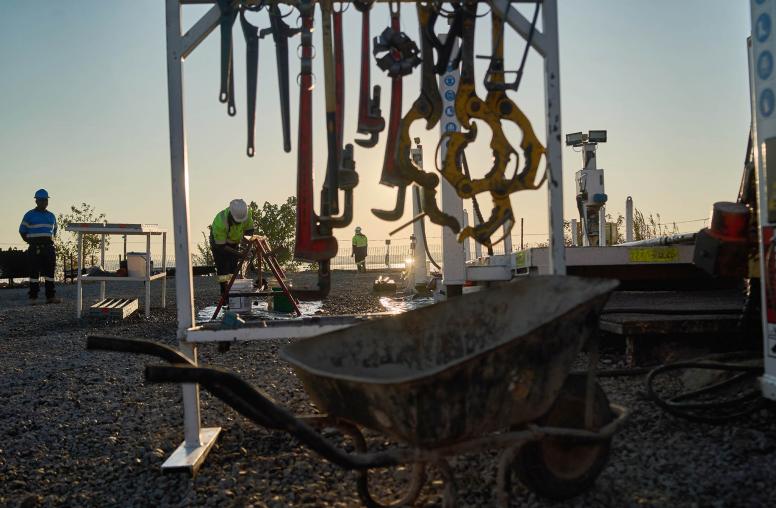Unlearning Violence: Democratic Republic of the Congo
DRC President’s Aide Aims to End Sexual Violence, Child Recruitment
Martin Luther King Jr. reminds us that “Human progress is neither automatic nor inevitable…” So when we see steps toward justice and a narrative of hope returning to a country worn by violence and conflict, those of us in the peacebuilding field feel reinvigorated. We were fortunate to see an example on July 14, when the Embassy of the Democratic Republic of the Congo co-sponsored with USIP a discussion with that country’s Personal Representative of the President in Charge of the Fight Against Sexual Violence and Child Recruitment, Jeanine Mabunda Lioko Mudiayi.

The visit to USIP came during her first official trip to Washington since being appointed by President Joseph Kabila. She was elected to Parliament a year ago and has taken up this newly developed office to address the challenges of the DRC’s two decades of violent conflict. The war has claimed an untold number of lives, and The World Bank has cited United Nations figures estimating that some 2.3 million citizens are displaced or refugees in the DRC and 323,000 Congolese live in refugee camps outside the country.
Since February 2013, with the end of the insurgency by the M23 rebel group, the government has made the commitment to address directly two legacies of the war -- sexual violence and the use of child soldiers. The aim is to change the narrative – the way citizens and others around the world think of the country -- from war to peace.
First on Mabunda’s road map is to change the global perception of the DRC as the rape capital of the world. With a six-point plan of action, she makes fighting impunity her top priority. Beginning meaningful dialogues with both the military and civilian justice systems, the government aims to demonstrate that there is no more tolerance for sexual violence in war or peace.
“The DRC is not only envisioning a new future, but is building the road through dialogue, justice and a recognition of the need for long-term healing.”
Mabunda reported that 135 military officials were convicted under the military justice system in 2014 for committing sexual violence. Other courts also convicted 150 civilian perpetrators of sexual violence, reflecting findings in international scholarship that sexual violence in war is committed more often by civilians than members of the military. Another successful effort underway in the DRC is the use of “mobile courts” that travel to underserved parts of the country of 70 million people.
But punitive measures aren’t enough; these must be integrated with ongoing support for victims and survivors of sexual violence and initiatives that will “break the silence” that so often obscures this most difficult subject. Mabunda described a new national call center to receive anonymous reporting on sexual violence.
It also is essential that victims can get the help they need to become successful survivors who can learn skills and find educational opportunities in their communities. New standards and new economic opportunities are vital for the country, especially in agriculture, where 80 percent of women seek their livelihoods.
Mabunda documented progress, indicating that the government has committed 16 percent of its budget to education, up from 6 percent five years ago. In addition, school attendance has increased from 7 million to 17 million in 10 years.
Child Soldiers
Changing the narrative of the country also demands a rigorous plan to eliminate the use of children in armed forces, whether government or otherwise. Mabunda said the government wants to make sure the country is demobilizing the child soldiers of surrendering rebel military groups as well.
In 2010, the DRC launched its National Action Plan (NAP) under United Nations Security Council Resolution 1325 for Women, Peace and Security, which calls for the protection of women and girls in conflict and their participation in decision-making related to conflict, including in negotiations and treaties.
The DRC also seems to be solidifying its commitment to “Children, Peace and Security,” a term I coined as a counterpart to the UN’s “Women, Peace and Security” agenda to help us perceive children as people who are not only vulnerable but also are capable of taking positive action. I think it is a framing of our security work that we must deliberately embrace. With the median age in the DRC being 17, such a child-focused platform committed to their protection from violence and their participation in rebuilding their rich country is what is needed.
The DRC is not only envisioning a new future, but is building the road through dialogue, justice and a recognition of the need for long-term healing of trauma by engaging people to break the silence and erase the shame, and thus write the new storyline for the country going forward. Mabunda and her government are leading a powerful effort with the support of her president and the people. She knows that the road to peace is long, but the optimism she expressed told me she understands that, in the words of Martin Luther King Jr., it “bends towards justice.”
Kathleen Kuehnast is USIP’s director for gender and peacebuilding.



